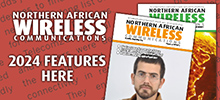04 September 2024

Stuart Will
TCCA TETRA Industry Group
TCCA’s Critical Communications World (CCW) 2024 conference and exhibition took place in Dubai in May and was one of the largest ever editions of the event. More than 4,700 visitors from 97 countries joined CCW over the three days, creating a true sense of international collaboration. More than 200 expert speakers took part in presentations, panel discussions, debates and Focus Forums that covered this year’s core theme of Securing society and industry - Connection is the lifeline.
With a wide range of topics covered, from AI and antennas to satellites and smart energy, one topic truly underpinned the event core theme – TETRA technology. TETRA is the most widely used critical grade professional radio technology in the world. The technology provides organisations with critical communication network solutions that are essential for reliable, efficient and safe operations.
Key markets for TETRA are obviously public safety, as it is used by governments around the world to secure citizens and society, but other verticals include transportation, energy, mining, military, and commercial applications, and many more – let’s take a look at a few of them.
For more than two decades, TETRA has experienced widespread adoption into the transportation sector including rail networks. TETRA is being regularly deployed, upgraded, and expanded, from metro systems to highspeed nationwide levels. Through ongoing investment, including enhanced security and resilience, and the introduction of new air interface encryption algorithms within the ETSI standard, TETRA is even more relevant and necessary for the rail sector. This helps to ensure that TETRA continues to meet needs for the rail sector today and well into the foreseeable future.
Across the world, the rail sector is expected to experience an upward trend, driven by several key factors such as infrastructure development and urbanisation, with the high degree of government emphasis on creating sustainable transport systems another major driver.
The mining sector is characterised by harsh user equipment and deployed base station environments, where networks must be always ‘live’ or operations stop – and that is costly. Long shifts need long battery life in communications equipment (typically >14Hrs). Noisy environments demand powerful audio and clear voice. It’s an environment where users wear gloves, so TETRA manufacturers offer equipment with reduced keypad and programmable keys; and the safety of workers is key - TETRA offers lone worker, GPS, man-down, localisation of users and GPS geofencing. For mines that are constantly expanding, TETRA offers both repeater/gateway radios and easily deployable outdoor base stations fit for use in these environments. In 2023, the global mining market experienced a 6.1% growth, reaching over US$2,145Bn, and is projected to increase to more US$2,775 billion by 2027, with a 6.7% CAGR.
In the utilities sector, typically workers will need system radio coverage, the ability to have contact with a dispatcher, PBX connectivity and Direct Mode operation where users can switch to device-to- device (‘walkie talkie’ style communication), separate from the network – this gives users the ability to not be interrupted by hearing system ‘chitter-chatter’ while carrying out critical tasks.
Climate change bringing extreme weather means resulting damage needs to be rectified quickly. TETRA has a suite of applications usable by this industry such as workflow management for lineman maintenance teams, using a combination of location-based assignment and SDS instructions.
Oil and gas industries have a wide range of needs. TETRA meets these for each operational area beyond voice, such as solutions requiring telemetry – and like cellular, there is significant growth in the uptake of TETRA data services. For oil and gas organisations, wireless data has shown it can improve efficiency in several areas. For remote monitoring solutions – e.g. for corrosion monitoring (SCADA), faster decision making based on near real-time data enables more rapid identification of potential problems, and more efficient maintenance inspections and operator rounds. The collection of status data and records, alerts of emergency situations, and location solutions means more efficient management of the workforce.
Normally, in a military context, we associate TETRA use for ‘must-have’ communications, encrypted radios and clear audio speech, typically with rapid deployable base stations being used in Tactical Operations. However, there is an increasing use of TETRA for other uses, with armies around the world employing TETRA for use in training exercises. TETRA radios are used with biometric sensers to monitor soldier performance (heart-rate, blood-pressure, temperature etc.,) all sending data back to a central command monitor centre tracking troops in action and how the exercises affect their performance.
One of the most distinctive aspects of TETRA is the extremely high level of interoperability among products (e.g. network infrastructure, radio terminals) from different manufacturers. This is achieved thanks to TCCA’s comprehensive Interoperability Certification (IOP) process which enables a truly open multi-vendor market for TETRA equipment and systems. This multi-vendor market gives concrete benefits both to the users in terms of a wide portfolio of compatible equipment, competitive pricing and rapid development of new product models; and to the industry in terms of a wider accessible market, faster market take-up and better possibilities for investment in new development.
TCCA recognises TETRA as a continuously evolving narrowband standard that delivers mission critical service globally every day. The work on updating TETRA encryption is designed to make TETRA secure for at least the next 20 years. For mission critical users requiring organisation-centric group voice communication and messaging services using narrowband technologies on dedicated frequencies, TETRA remains the optimal multi-vendor interoperable choice for the foreseeable future.
The TETRA story will continue to be told at Critical Communications World 2025, taking place 17-19 June at Brussels Expo in Belgium, with host operator ASTRID supporting the event.






